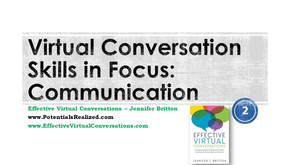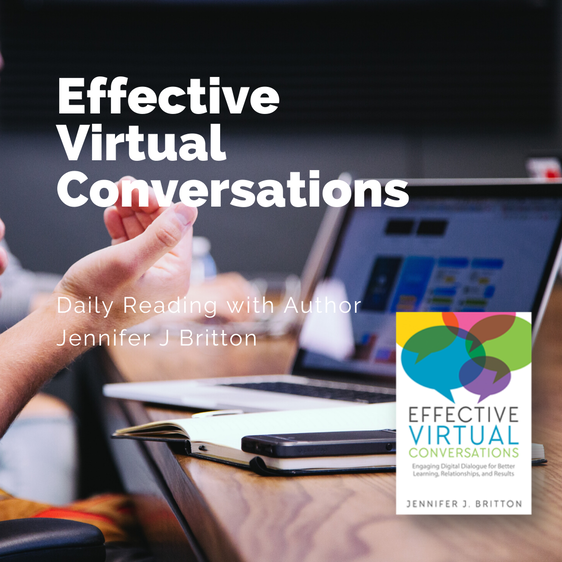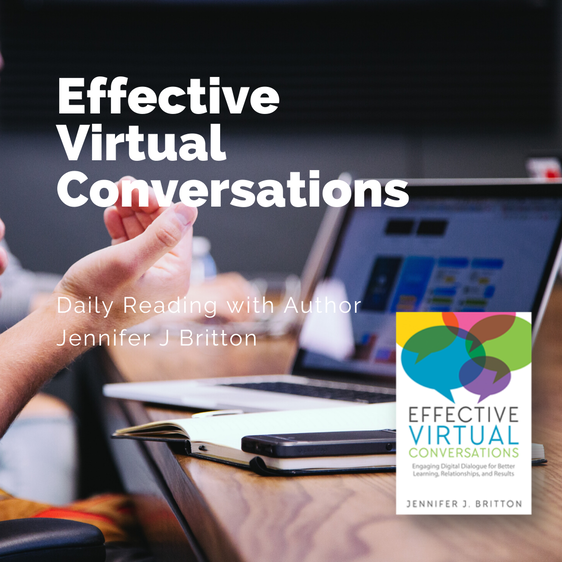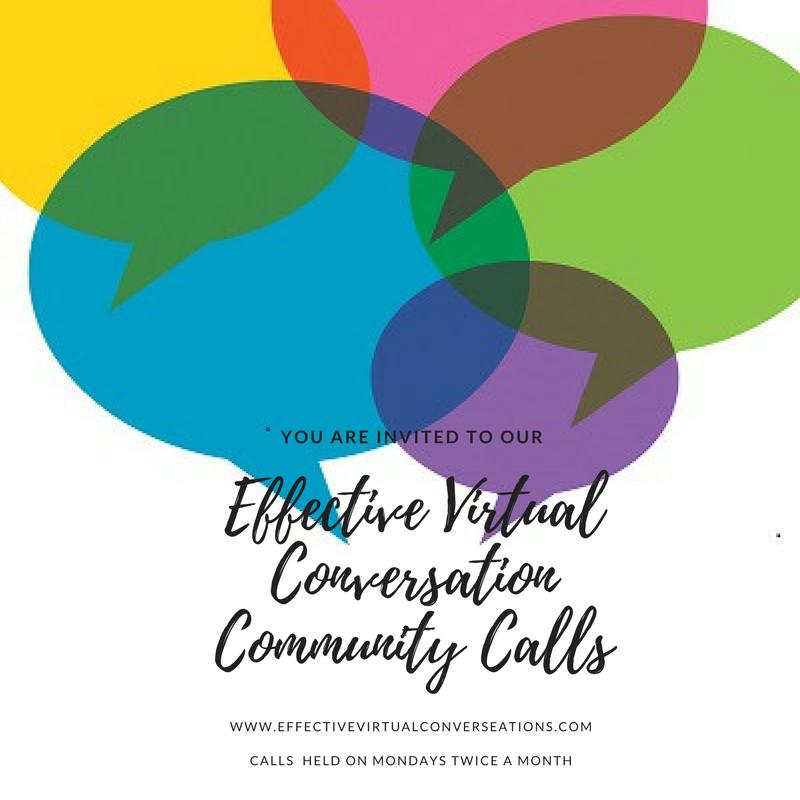|
Welcome back to Day 30 of the Effective Virtual Conversations reading series. Day 30 explores pages 81 to 84 of Chapter 3 – What Every Conversation Needs: Essential Elements and Core Skills. In today’s reading we are exploring the 5 W's and and H around questions. Being able to ask great questions is imperative to success. What are the key questions which are going to help your team move forward? Be sure to have a pen and your journal handy or today’s reading – you’ll want to take notes and put these questions into practice right away! Enjoy, Jennifer Jennifer Britton
Founder and CEO - Potentials Realized Phone: 416-996-8326 Author of several books including Effective Virtual Conversations (2017) and PlanDoTrack for Virtual and Remote Professionals (2019) - pick up a digital PDF copy of PlanDoTrack at our site. Contact us to discuss support for your remote workspace - team, individual and organizational coaching, training and virtual facilitation Download a copy of the Remote Working Whitepaper here
0 Comments
Welcome back to Day 29 of the Effective Virtual Conversations reading series. We are in the middle of Chapter 3 – What Every Conversation Needs: Essential Elements and Core Skills. Today’s reading takes us through pages 77 to 81 and the following chapters:
As I write “Questions form the backbone to any coaching conversation”. Questions in the remote space can be use to expand awareness, support action or discoveries or help people make connections. Listen in to tomorrow’s episode as I share a series of questions along the 5 W's and an H framework. Best, Jennifer Jennifer Britton
Founder and CEO - Potentials Realized Phone: 416-996-8326 Author of several books including Effective Virtual Conversations (2017) and PlanDoTrack for Virtual and Remote Professionals (2019) - pick up a digital PDF copy of PlanDoTrack at our site. Contact us to discuss support for your remote workspace - team, individual and organizational coaching, training and virtual facilitation Download a copy of the Remote Working Whitepaper here  Last week here at the blog I shared the first of eight skill areas which are important in virtual facilitation - Setting the Context. Today we look at another Skill area - Communication. At the heart of great conversations is this skill set which I break down to:
Let's look briefly at each one (and a reminder that I go into much greater depth in chapter 3 of EVC): Listening: Depending on the type of virtual conversation platform we are using listening can be enhanced or deepened by other senses - such as seeing when we are on a streaming call. Listening is a skill set which may not be as well developed. Communication is not only what is being said but how we interpret it. How are you listening? Here are some questions to consider from my Teams365 blog: As you consider your own listening skills right now, reflect on these questions:
Inquiry and Reflection - The Fifth Discipline Fieldbook notes "Two types of skill are central to this work: they are reflection (slowing down our thinking processes to become more aware of how we form our mental models) and inquiry (holding conversations where we openly share views and develop knowledge about each other's assumptions)" (pp 77, Senge et al) What are you doing to build in inquiry and reflection into your design - for example - not trying to fit too much into calls or Reading the environment - When you spend time in the virtual space you begin to notice the energy of a call. Some feel as if the air has been sucked out while others pass like the blink of an eye. As we'll see in other posts (and throughout the book) masterful virtual facilitators "read the room" and are adept at using questions, and pace changes, to adjust. Questioning - Questions form the backbone to any great conversation, and in the arena of communication questions are a virtual facilitators ally. Key things to keep in mind: Use open ended questions (starting with What) to invite people into the conversation Be aware that HOW questions will Keep them short - 5-7 words only Watch how many questions you are asking at once. More than one or two and you may notice the silence on the other side which could indicate - what are they asking? Avoid Why questions until there are high levels of trust. Why questions often put people on the defense. Pace and Pitch - the final area I wanted to touch on in this post is getting you to think about the pace you want to set in your virtual call. Consider the individuals you are working wtih. Are they quick paced? Do they appreciate a reflective pause? How are you using silence to allow people to think, and reflect? What are you doing to change the way people engage - i.e. using visuals or breakouts or annotation. I cover many of these questions in community calls, as well as my monthly newsletter for Effective Virtual Conversation enthusiasts. Consider: What's the best pace and pitch for this group? Over the next month or two I’ll be exploring some of the many skills housed in these eight areas. For more on this you may want to check out my January 2018 Community Call, as well as Chapter 3 of Effective Virtual Conversations where I explore these skills more in-depth. Out of the five skills I have highlighted today, which ones are your strengths? What can you do to leverage these more? Which one would you like to put more attention around? Have a great week, Jennifer Jennifer Britton Potentials Realized | Coaching Team Leaders Team and Leadership Development | Coaching | Retreats. Follow us on Twitter @jennbritton (coaching/facilitation) @Teams365 (leadership) Phone: (416)996-8326 Looking to enhance your virtual conversations - Conference calls? Webinars? Virtual coaching work? Pick up a copy of my new book, Effective Virtual Conversations, at Amazon. Great news! The Virtual Facilitation Essentials program has been reviewed and approved by the International Coach Federation for 8.5 hours of Continuing Coach Education (5.5 hours core competencies). Looking to boost your virtual skills and want a booster around the basics? Join us for this 5 week interactive webinar learning experience. The next group starts Friday February 16th at 1:15 pm ET (calls are 5 Fridays from 1:15-2:30 pm Eastern/Toronto) For Coaches: The Coaching Biz Growth Lab - a three month group focused on your coaching business growth. We'll be kicking off on February 1st at 3 pm ET for 7 calls over the three months. Other groups will start Spring and Summer 2018. |
AuthorJoin Effective Virtual Conversations Author Jennifer Britton for regular posts to spark your ideas and conversations virtually! Jennifer is the author of five books including her latest PlanDoTrack. Upcoming Programs Virtual Facilitation Essentials: (8.5 CCEs with ICF) Mondays 1:30 - 245 pm ET:May 4, 11, 18, June 1 and 8 (8.5 CCEs) - Virtual
OR participate in a 1 day offering. Upcoming dates include Wednesday April 29 OR May 6 (9 - 430 pm ET) Group Coaching Essentials (8.75 CCEs); Fridays 10 - 1115 am ET: April 24, May 1, 8, 15 and 22,2020 (Virtual - by zoom) PlanDoTrack Facilitator Training - Join our list of those interested in participating in the next 3 day virtual offering - Mid-May to June Learning Lab and Design Studio meets throughout the year on Fridays from 8:45 -930 am ET (Weeks 1 and 3 of month). Join us for a month or the year. October's focus is on team coaching. Coaching Biz Growth Lab - Business Group Coaching for Coaching Business Owners - Meets Week 1 and 3 Fridays of Each Month (3-4 pm ET). Archives
July 2020
Categories
All
|


 RSS Feed
RSS Feed
